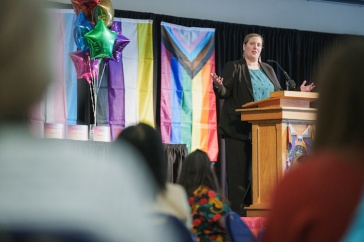How does food and nutrition insecurity affect physical, mental and social well-being? How does it vary by race, ethnicity, gender and sexuality?
These are questions that researchers in the agriculture, nutrition, and food systems (ANFS) department at COLSA ask themselves daily, and they seek to find the answers through their research. Below, we’ve highlighted how the work of three ANFS professors serves and supports communities that are marginalized based on their race and ethnicity, socioeconomic status, sexuality and gender identity
Identifying food insufficiency in the LGBTQ+ community
Sociologist and Assistant Professor Analena Bruce leads the Food Systems Lab at UNH, where she examines food supply chains and how to make them more equitable and resilient. Bruce recently collaborated with Jess Carson, research assistant professor at the Carsey School of Public Policy, and postdoctoral research associate Isaac Leslie to look at food insufficiency (defined as lacking adequate food in the past seven days) among LGBTQ+ (lesbian, gay, bisexual, transgender and queer, plus other sexual and gender identities) people living in New England.

Using data from the U.S. Census Bureau’s Household Pulse Survey, they found that 13 percent of lesbian, gay and bisexual people experience food insufficiency — more than twice the rate of heterosexual people. They also found that more than 26 percent of transgender New England residents experience food insufficiency — more than four times the rate of cisgender people (people whose personal identity or gender corresponds with their birth sex).
However, it was at the intersection of gender identity, sexuality and race that they found some of the most concerning findings, says Bruce. For example, one in three Black transgender New Englanders reported not having enough food in the past week.
“What this means is that addressing food insecurity needs to be done with explicit attention to the intersections of structural racism, discrimination and marginalization based on race, gender identity and sexuality,” Bruce explains. “There’s an assumption that increasing the availability of nutritious foods will solve the problem, but it’s clear we need to dig deeper to understand why we have these very stark disparities in our food system.”
Examining the nutrition and well-being of Hispanics
Nutrition researcher and Assistant Professor Maria Carlota Dao investigates the interaction between human health, diet and the gut microbiome — the trillions of microorganisms living in our intestinal tracts.
A diet rich in micronutrients and healthy fats and a variety of fiber sources often leads to a more diverse gut microbiome and a healthier person, says Dao. And quality of diet plays just as important a role as quantity of diet, especially when it comes to gut microbiome diversity, she adds, as do many other factors — including age, the environment and medication use, to name a few.

assistant professor Maria Carlota Dao.
Dao is especially interested in the interplay of diet and gut microbiome diversity in ethnic minority populations in the U.S., like Hispanics, who make up more than 18 percent of the total U.S. population. The interdisciplinary nature of her research ensures that she’s accounting for factors like behavior and demography in addition to considering gut microbiome health. For example, Dao and her team recently concluded a phone-based survey of more than 138 Hispanic New Hampshire residents to assess different aspects of physical and psychosocial well-being, examining how Hispanic residents were coping mentally and physically during the pandemic.
“The goal is for all of this information to feed into the development of nutrition strategies that support living healthy lifestyles,” says Dao. “We need to holistically consider the characteristics of the people seeking these interventions and tailor the strategies to their specific situations.”
Improving nutrition education for refugees
Nutritional epidemiologist and Assistant Professor Sherman Bigornia studies how diet can influence our risk for chronic health conditions, like cardiovascular disease and diabetes, and he uses the findings to inform intervention programs designed to improve or maintain health and wellness. For the past few years, he’s worked closely with New Hampshire’s Bhutanese refugees through a collaborative relationship with Building Community in New Hampshire to identify how federal educational initiatives meet their needs.

It’s estimated that between 2,000 and 3,000 Bhutanese people live in the Granite State. Refugee adults in the U.S. are one of the groups eligible for the Supplemental Nutrition Assistance Program (SNAP) and the SNAP Education (SNAP- Ed) initiative aimed at helping SNAP beneficiaries consume a diet in line with federal dietary guidelines. Bigornia wanted to know if SNAP-Ed considered the cultural aspects of Bhutanese refugees.
“Our preliminary evidence suggests that SNAP Education doesn’t appear to have a significant impact on dietary quality or cardiometabolic risk factors for the Bhutanese refugees,” says Bigornia. “To me, what that indicates is that just translating the lessons to the appropriate language isn’t enough — you also need to take into consideration the cultural context of the audience.”
He adds, “I’m really fortunate that I can use my platform and resources to inform dietary prevention or treatment efforts tailored to communities that are not well represented in nutrition research. That’s why the research that I’m doing, that Carlota is doing and that Analena is doing is so important. We’re examining appropriate ways to reduce the health disparities, in a more personalized manner, in the different communities we’re working with — all of which are underrepresented.”
This story appears in the Fall 2022 issue of THRIVE, the flagship bi-annual publication of UNH’s College of Life Sciences and Agriculture. Subscribe here to receive your copy of the next issue of THRIVE.
-
Written By:
Nicholas Gosling '06 | COLSA/NH Agricultural Experiment Station | nicholas.gosling@unh.edu
















































